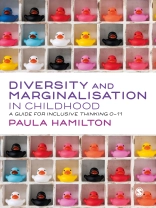This core text offers you an accessible foundation to the topics of diversity, inclusion and marginalisation. Not only will you develop an understanding of how marginalisation happens, you will be encouraged to question and challenge policy and practice through case studies, reflective questions and activities. The book analyses issues encountered by marginalised groups and the impact these may have on the lives of those concerned, together with how you, as a practitioner, can help to empower these individuals and groups.
With key chapters bringing attention to less cited marginalised groups such as transgender children, children with mental health conditions and looked after children, the author critically analyses the difficulties and challenges of inclusive ideology in practice, the role of mass media in reinforcing prejudice and examines theoretical frameworks and concepts related to marginalisation, inclusion and diversity.
Innehållsförteckning
Introduction: Understanding Marginalisation
Chapter 1: Critical Inclusion: Concepts, Theories, Challenges and Practice
Chapter 2: Mass Media, Social Bias and the Representation of Minority and Marginalised Groups
Chapter 3: Child Poverty and Low-Income Families
Chapter 4: Stigma of Mental Ill-Health in Childhood
Chapter 5: Children with Special Educational Needs and Disabilities
Chapter 6: Children in Care, Fostering and Adoption
Chapter 7: Gender Development and Identities: Intersex and Transgender Children
Chapter 8: Religion, Antisemitism and Islamophobia
Chapter 9: Asylum Seeker and Refugee Children (and Children who have English as an Additional Language)
Chapter 10: Gypsy, Roma and Traveller children
Chapter 11: Supporting ′Most Able′ Children
Conclusion: Final Thoughts on Critical Inclusion
Om författaren
Paula Hamilton is a senior lecturer at the University of Chester. After completing a teacher training degree in the early 1990s, Paula worked on a European research project which focused on health promoting schools. She then spent 10 years within further education teaching on early childhood studies and health and social care courses. Since 2007, she has worked as a senior lecturer in higher education lecturing on programmes relating to early childhood, family, youth and education studies. Her Ph D, completed in 2011, focused on the inclusion of migrant worker children into primary schools in North Wales. Paula’s research and publications lie in the field of social justice, inclusion, diversity and the health and well-being of children, young people and families.












